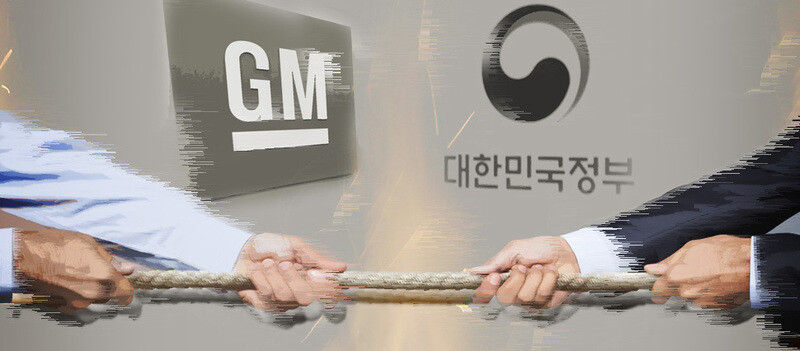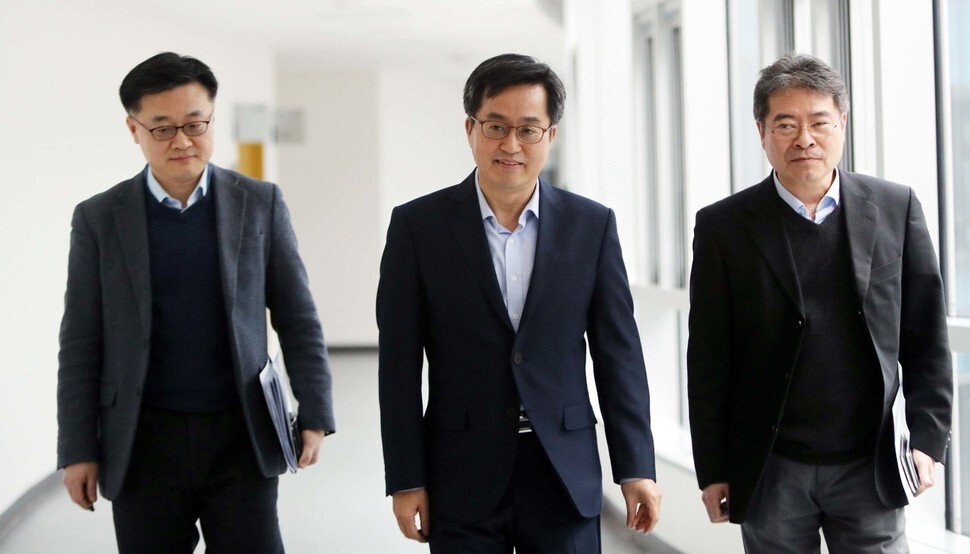hankyoreh
Links to other country sites 다른 나라 사이트 링크
South Korean government in talks to provide assistance to GM Korea

The South Korean government and GM corporate headquarters in the US have begun wrangling over a plan to rescue GM Korea. Deliberations began on Feb. 22, as GM International President Barry Engle held back-to-back meetings with Koh Hyung-kwon, first vice minister of the Ministry of Strategy and Finance, and with Lee In-ho, vice minister of the Ministry of Trade, Industry and Energy.
The two sides sat down for official deliberations just ten days after GM announced on Feb. 13 that it plans to close GM Korea’s Gunsan factory. On Feb. 22, GM conveyed a request for help from the South Korean government to normalize management at GM Korea, while the South Korean government laid out three principles, including GM playing a responsible role. At this early stage, there are significant differences between the two sides on the responsibility for GM Korea’s predicament and on the plan for resuscitating the company.
GM’s request for government aid consists of four basic components – collateral provided by the Korea Development Bank (KDB), GM Korea’s second largest stockholder; a paid-in capital increase from the KDB, financial support and tax benefits. The recovery plan that GM proposed in exchange includes a plan for US$2.8 billion in new investment, a debt-equity swap for US$2.7 billion of debt owed to corporate headquarters and business restructuring.
The South Korean government has expressed its displeasure with these requests and maintains that GM should first lay out a medium- to long-term plan for improving management conditions, with the goal of saving GM Korea. Seoul believes that it needs to prepare for the ultimate eventuality of GM withdrawing from the South Korean market altogether. The government has previously had the KDB communicate eight requests to GM, which include disclosing its financial performance, creating a plan for turning a profit, promising to let the KDB exercise auditing rights and releasing a medium- to long-term management plan.

Government lays out three principles for assistance
The first of the three principles that the government brought up on Feb. 22 was the matter of the largest shareholder’s responsibility. “We intend to discuss ways to restore GM Korea to normal operations according to three principles: the responsible role of the largest stockholder in normalizing operations at GM Korea; sharing the pain with all stakeholders, including shareholders, creditors and the labor union, in line with restructuring principles; and coming up with a plan to normalize management that is sustainable in the long term, rather than a stopgap measure that only addresses the current difficulties,” Deputy Prime Minister and Finance Minister Kim Dong-yeon said during a press conference.
“This means a principled response, implying that the responsibility for GM’s poor management must not be shifted to the South Korean government,” a senior South Korean government official said.
The government’s stance appears to mean that it will not succumb to GM’s strategy of attacking the government’s weakest link: the desire to save the jobs of factory workers. It is also a warning for GM not to naively assume that the government cannot help but provide the aid because of concern for massive layoffs and the local elections coming up in June. Ideas for new businesses – such as converting the Gunsan factory, if it is closed, into an electric vehicle production base – are reportedly being discussed in some parts of the government.
The topic on which the two sides approached a compromise during the day’s deliberations was quickly moving forward with a due diligence. “GM agreed to submit to a due diligence of the company’s operations in good faith, and as soon as possible,” Kim said.
But the view in the industry is that even if this due diligence begins as early as next week, the results will not be available for at least two months.
“It’s too soon for full-fledged negotiations, because we need to confirm GM’s commitment to improving management, its concrete recovery plan and the actual management situation at GM Korea. We’ve only now taken the first step,” said an official from the Ministry of Trade, Industry and Energy. This implies that the South Korean government is not committed to the negotiation deadline of the end of the month that GM declared while announcing the closure of the Gunsan factory.
In related news, Engle reportedly said during a meeting with Im Han-taek, director of the GM Korea branch of the Korean Metal Workers’ Union, that GM Korea will run out of cash at the end of February and will be unable to pay the wages of production line workers on Mar. 10. GM Korea also sent an email to its middle managers containing the company’s collective bargaining proposal for wages. The company says that wage increases should be postponed until it becomes more profitable and that there can be no bonuses in 2018.
By Hong Dae-sun and Choi Ha-yan, staff reporters
Please direct questions or comments to [english@hani.co.kr]

Editorial・opinion
![[Guest essay] The real reason Korea’s new right wants to dub Rhee a founding father [Guest essay] The real reason Korea’s new right wants to dub Rhee a founding father](https://flexible.img.hani.co.kr/flexible/normal/500/300/imgdb/original/2024/0423/8317138574257878.jpg) [Guest essay] The real reason Korea’s new right wants to dub Rhee a founding father
[Guest essay] The real reason Korea’s new right wants to dub Rhee a founding father![[Column] ‘Choson’: Is it time we start referring to N. Korea in its own terms? [Column] ‘Choson’: Is it time we start referring to N. Korea in its own terms?](https://flexible.img.hani.co.kr/flexible/normal/500/300/imgdb/original/2024/0423/3617138579390322.jpg) [Column] ‘Choson’: Is it time we start referring to N. Korea in its own terms?
[Column] ‘Choson’: Is it time we start referring to N. Korea in its own terms?- [Editorial] Japan’s rewriting of history with Korea has gone too far
- [Column] The president’s questionable capacity for dialogue
- [Column] Are chaebol firms just pizza pies for families to divvy up as they please?
- [Column] Has Korea, too, crossed the Rubicon on China?
- [Correspondent’s column] In Japan’s alliance with US, echoes of its past alliances with UK
- [Editorial] Does Yoon think the Korean public is wrong?
- [Editorial] As it bolsters its alliance with US, Japan must be accountable for past
- [Guest essay] Amending the Constitution is Yoon’s key to leaving office in public’s good graces
Most viewed articles
- 1[Column] ‘Choson’: Is it time we start referring to N. Korea in its own terms?
- 2Senior doctors cut hours, prepare to resign as government refuses to scrap medical reform plan
- 3Why Korea shouldn’t welcome Japan’s newly beefed up defense cooperation with US
- 4Opposition calls Yoon’s chief of staff appointment a ‘slap in the face’
- 5[Guest essay] The real reason Korea’s new right wants to dub Rhee a founding father
- 6Terry Anderson, AP reporter who informed world of massacre in Gwangju, dies at 76
- 7[Column] The clock is ticking for Korea’s first lady
- 8[Editorial] Japan’s rewriting of history with Korea has gone too far
- 9New AI-based translation tools make their way into everyday life in Korea
- 10Survey: S. Koreans spend more time using smartphones than eating